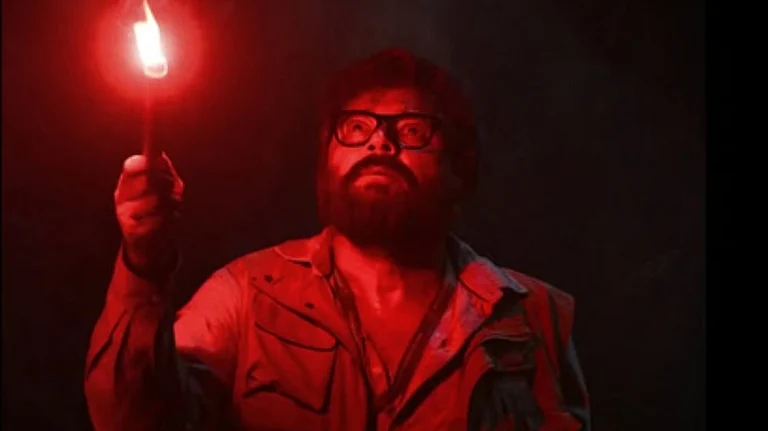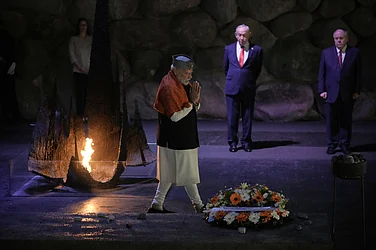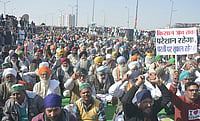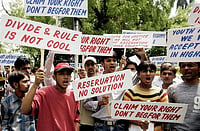The Israelis across the country on Saturday woke up to a morning like none other. Their phones buzzed with alerts and public sirens blared throughout the country as thousands of rockets rained from the skies. It didn’t make sense — but there was no time to think.
As soon as they woke up, instincts kicked in. Sixty seconds — that’s what most of them had. It was a race against incoming rockets. So, in their pyjamas and slippers —or barefoot— they raced to bomb shelters in and near their houses and apartment blocks as rockets rained from the skies. It was not the first time that they had raced like that, but they would soon learn that they were in uncharted waters.
The Shabbat after a Jewish holy week was supposed to be extra quiet but turned into one of the darkest days in Israel’s history as Hamas launched the deadliest attack ever. So far, at least 1,300 deaths and 3,000 injured have been confirmed — the worst single-day toll since the Holocaust.
Indian researcher Khinvraj Jangid, who has been in Israel for the past two years, was among those who woke up shortly after 6 am to the blaring sirens and dashed for cover. He says the 10 hours that he spent in and out of shelters as rockets rained from the sky were quite tense. For the first two hours, everyone around Jangid struggled to make sense of what was happening.

The true extent of the Hamas offensive has only come to light now as it took the Israeli military more than two days to completely retake all the areas. On Saturday morning, Hamas invaded Israel via land on bikes and trucks by bulldozing the border fence, via air on gliders, and via sea on boats. At a desert music festival, they killed at least 260 and in two nearby communities around 140 corpses were found, including those of children. More than 100 have been taken as captives and are being held as leverage in the Gaza Strip.
Here is how Jangid, Director of the Jindal Center for Israel Studies (JCIS) at the OP Jindal Global University, described the Hamas offensive in his own words, as told to Outlook's Madhur Sharma:
The Saturdays are very quiet in Israel. This Saturday, the day of Shabbat after the Jewish holy week of Sukkot, was supposed to be extra quiet. It was supposed to be a slow day when people rested at home and the establishments were shut. That ended just around 6 am when sirens alerting about incoming rockets went off. We ran to bomb shelters. Most of us usually have only around 60 seconds to safely make it to the shelters.
The next 10 hours were anxious. We were in and out of the shelter throughout even as we tried to make sense of what was happening. We checked for news updates on our phones but there was nothing. All news websites had stories from the previous day. It took around two hours for websites to be updated as no newsroom was functional that early in the morning because of the holidays.
We were hearing booms throughout as the rockets were being intercepted by the Israeli Iron Dome air defence system. The rockets were a distraction for a land invasion as we learnt that 200-300 infiltrators had entered Israel and attacked the southern border region. My university, Ben Gurion University, is also in the same region, so if I were there, I would also have been stuck. People I know are still in the region. I also reached out to check on my acquaintances in the region and got messages that the infiltrators went around in pick-up trucks and bikes in towns on shooting rampages for hours. Close friend and mentor, Prof. Ilan Toren lost his daughter and son-in-law. They were shot dead in their home. Prof. Troen was to give key note speech for an international conference where I was to meet him day after, on Sunday.
For six hours, there was no military deployment in the region. It was after 12 pm that the military reached the region. It was because the border region had minimal security presence because most of the military was also observing the religious holidays. Until the military intervened, however, the violence continued. People were killed in the houses and at intersections in broad daylight by terrorists roaming around brazenly on pick-up trucks and bikes — something never seen in Israel.
The Hamas attack broke all precedents and deeply shook Israeli society. For the past two decades, Hamas fired rockets in response to clashes on the ground. But there were no clashes lately. The situation was such that Israel had actually increased the work permits for Palestinians from Gaza employed in Israel over the past month, which suggests there were no increased tensions and there was no assessment that any attack could come from Gaza. This shows that there was a complete breakdown of government assessment from the ground reality.
The Hamas attack marks massive intelligence and security failure. For months, the Israeli leadership was stuck in a political crisis. While the Defence Minister warned of the effect of protests and crisis on security preparedness, he was mocked even by his own coalition’s ministers. Even as he issued warnings, he was also stuck in attempts to arrive at a compromise in the political crisis. This way, the lack of political support from his own party and government distracted Defence Minister Yoav Gallant from carrying out his duty to ensure military preparedness.
The protests had polarised the military and intelligence community of Israel. The Defence Minister was distracted, the military’s morale was affected, and there were resignations and refusals to serve in some elite battalions. The Israeli military was therefore in a weakened state. Then, there was the timing of the attack. Hamas exploited this and mounted the attack during that one week of the year when Israel is least active in security terms. This was a miserable failure to assess the situation and anticipate and attack and prepare for it.
In some places, there was no military intervention up to eight hours. This is very shocking for a country like Israel where security is always a top priority. It is not just the brazen killings that have shocked the nation, but the taking of hostages, particularly of children and the elderly. The Israeli society understands that soldiers could be killed or taken captive, but the abduction of children and the elderly —in wheelchairs— is a completely new reality that has deeply refreshed the tales of pogroms from Holocaust.
The presence of hostages also complicates any potential ground offensive into Gaza Strip. As of now, the perception around me is that the war has been lost and no more lives should be lost. As there are so many hostages, the government would have to talk to Hamas, but the national anger and humiliation would not allow any softening of stance on Hamas in the near-term.
As for the Palestinians, Hamas has dealt a major blow to their movement, which was already dead. The movement is deeply divided and is leaderless. Now, there is no one like Yaser Arafat who had great clarity. Arafat knew that the Palestinians were on their own as the Arab states would never themselves create the State of Palestine. He used to say that if the Arabs had any intention of creating Palestine, then they would have announced the formation of Palestine when Egypt controlled Gaza and Jordan held West Bank. Now, there is no Palestinian leader with such clarity or any real agenda. Palestinian Authority (PA) President Mahmoud Abbas is a corrupt man and is highly unpopular who has no agenda like Arafat. There will be no positive outcome for the Palestinian cause from this war.
The two-state solution has been irrelevant for some time and will get further irrelevant now. Who do you talk to? Who represents the Palestinians — the PA or Hamas? Hamas is a militant organisation and is yet to accept the two state solution. One cannot negotiate after the terrorist-like attack on oneself. It is also high time that India does not support Hamas and calls out for its use of terror. The Indian Left, who I otherwise look up to on several issues, has got it completely wrong on the Hamas and Israel-Palestine issue.
As for the Israelis, they are left with some fundamental questions now. For one, they need to see if they can do without having their conflict resolved with the Palestinians. Conflict management has failed.Separating religious affairs and holidays from the State is essential as well. The nation shut for one whole week every year in the name of religious holidays left the country thinly-protected. Just like Yom Kippur War led to the normalisation of ties between Egypt and Israel, it is possible that some sort of political settlement could be arrived at in the long run between the Palestinian Authority and Israel now, but that is impossible in the short-term as national anger and humiliation is too high for any legitimisation of Hamas.
We do not know where we are headed from here. A ground invasion of Gaza would be a highly complicated affair because of hostages. One thing, however, is clear. In Israel, the ultra-orthodox religious Jews don’t serve mandatorily in the military whereas the rest of the Jews are conscripted. In the recent political crisis, the liberal-secular Jews who serve in the military demanded that the ultra-orthodox should also be conscripted. One of the ministers in the current government who belongs to an ultra-orthodox party argued that reading the Jewish holy book of Torah is as important as serving in the military. That equation was insulting to those who fight and die in the military and now it stands shattered. Ordinary Israelis realise they have been failed by their leaders as well as rabbis who ridiculed the demands of the army chiefs over the last one year.






















